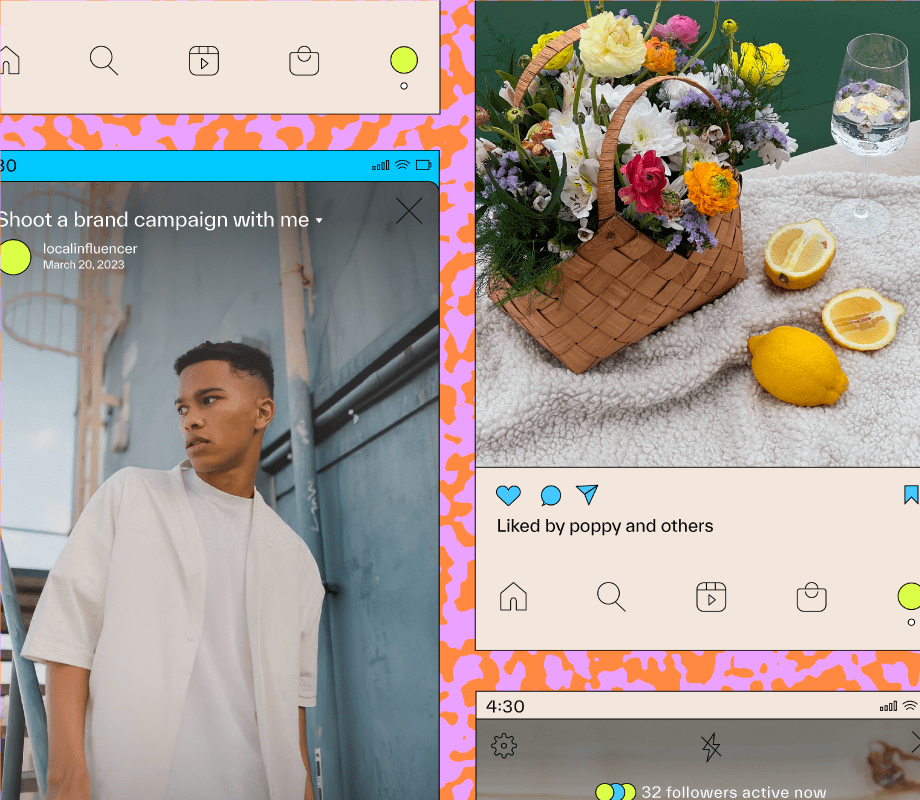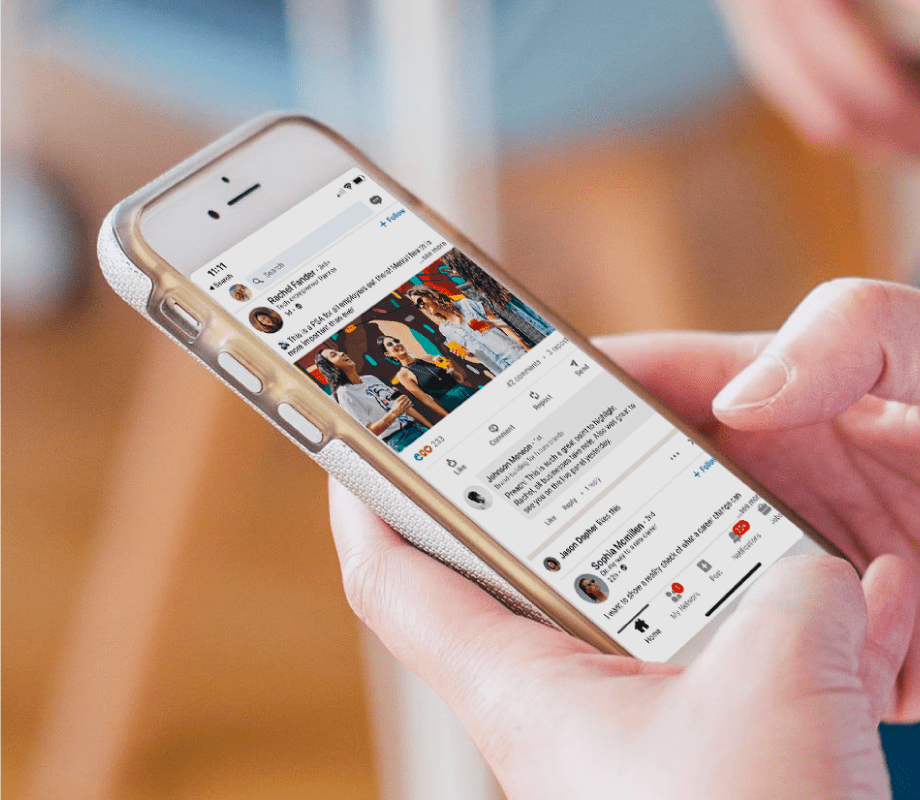In 2026, becoming an influencer doesn’t happen overnight.
Gone are the days when posting sporadically would lead to thousands of followers, and a steady stream of engagement.
But fear not! With the right tools and strategies, aspiring influencers can still tap into a goldmine of success.
We’re breaking down how to become an influencer — from establishing your content pillars to landing your dream brand partnership.
Table of Contents
- What is an Instagram Influencer?
- Step #1: Build Your Personal Brand
- Step #2: Find Your Niche
- Step #3: Perform Audience Research
- Step #4: Post Content Regularly
- Step #5: Shoot Reels and TikToks
- Step #6: Cultivate an Influencer Community
- Step #7: Diversify Your Platforms
- Step #8: Find Brands That Work With Influencers
Join over 1 million marketers to get social news, trends, and tips right to your inbox!
Email AddressWhat is an Instagram Influencer?
An influencer is a social media personality who influences their audience to purchase the products or services that they promote.
Their social feeds will have a good blend of personal branding, content creation, and promotion:
What's the difference between an influencer and a content creator?
You may have heard the terms “influencer” and “content creator” used interchangeably, and while they are similar, there is a difference between the two.
A “content creator” is anyone who creates digital content, while an influencer has a promotional strategy as a core part of their social media presence.
What are the Different Types of Influencers?
Influencers are commonly categorized into five different tiers based on their follower count:
Nano Influencers: 0K – 10K followers
Micro-Influencers: 10K-100K followers
Mid Influencers: 100K – 500K followers
Macro Influencers: 500K – 1M followers
Mega Influencers: 1M+ followers
Macro and Mega influencers, have gigantic audiences — making them a great choice for campaigns where mass awareness is key.
On the flip side, Nano and Micro-influencers have a much smaller, but often more engaged audience, making them a great choice for brands looking to tap into hyper-niche communities. We've broken down the 14 Types of Social Media Influencers You Need to Know to help you figure out where you'll want to fit in.
FYI: With Later's influencer marketing platform, you can get discovered by brands and earn more with your content. Join today!
Step #1: Build Your Personal Brand
The first step to becoming an influencer is figuring out what your personal brand is.
Your brand’s identity is the foundation on which you’ll build upon.
It’s your why and will help you shape your voice, the design of your posts, and how you connect with your community. Ask yourself:
How would you describe your brand in one sentence?
What’s your purpose?
Who is your target audience?
Why should Instagram users follow you?
Once you’ve got a lock on your personal brand, you can optimize your social media profiles to reflect just that!
How to Optimize Your Social Media Profiles
Nowadays, your social media profile is pretty much a cover letter, portfolio, and website all wrapped up in one.
Think of it as a mini pitch to brands, showing them who you are, what you offer, and the type of content you create.
So with just seconds (and limited character space) to communicate all of that, here’s what you need to include across all your social profiles:
Choose a Relevant Profile Picture
Share Your Story
Include Targeted Keywords in the Name Field
Add a Call-to-action and Action Buttons
Share Your Contact Information
Tag Related Accounts and Add Your Branded Hashtag
Use a Link in Bio Tool
Need some inspo? We got you. Here's how to optimize your bio for Instagram and TikTok.
ICYMI: You can level up your Instagram bio with Later Link in Bio — a mini web page built into your profile that makes your content more clickable. Sign up today — for free!
Step #2: Find Your Niche
The more focused and niched you are in the beginning, the easier you’ll be to grow a community that trusts and loves your content.
Why? Because it’s better to be an expert on a few things than to be a jack-of-all-trades.
But identifying only one or two topics to post about can be tricky — we’re multi-faceted people with many interests.
So, here are some questions to help you discover your niche:
What am I most passionate about?
What am I most knowledgeable about?
What could I happily create content for without making a dime?
Once you have your overall niche established, you can focus on your content pillars. This is three to five topics you’ll consistently create content for.
If you’re a fashion blogger, your content pillars could include styling tips, lifestyle posts, and social media insights.
For example, take a scroll through Madeleine White’s TikTok page and you’ll notice she sticks to GRWMs, OOTDs, thrift flips, and styling "weird things" as her established topics:
Once you have those pillars established, it’ll be a lot simpler to create content for Instagram, TikTok, YouTube, and more.
TIP: Build a content calendar for the month — it'll help you create a consistent posting cadence and avoid last-minute scrambling!
Step #3: Perform Audience Research
To succeed as an influencer, knowing your target audience and information about the people who follow you will help you create content that resonates — and ultimately performs well.
The quickest way to get a snapshot of your audience demographics (such as age and location) is through your Instagram or TikTok native analytics dashboard:
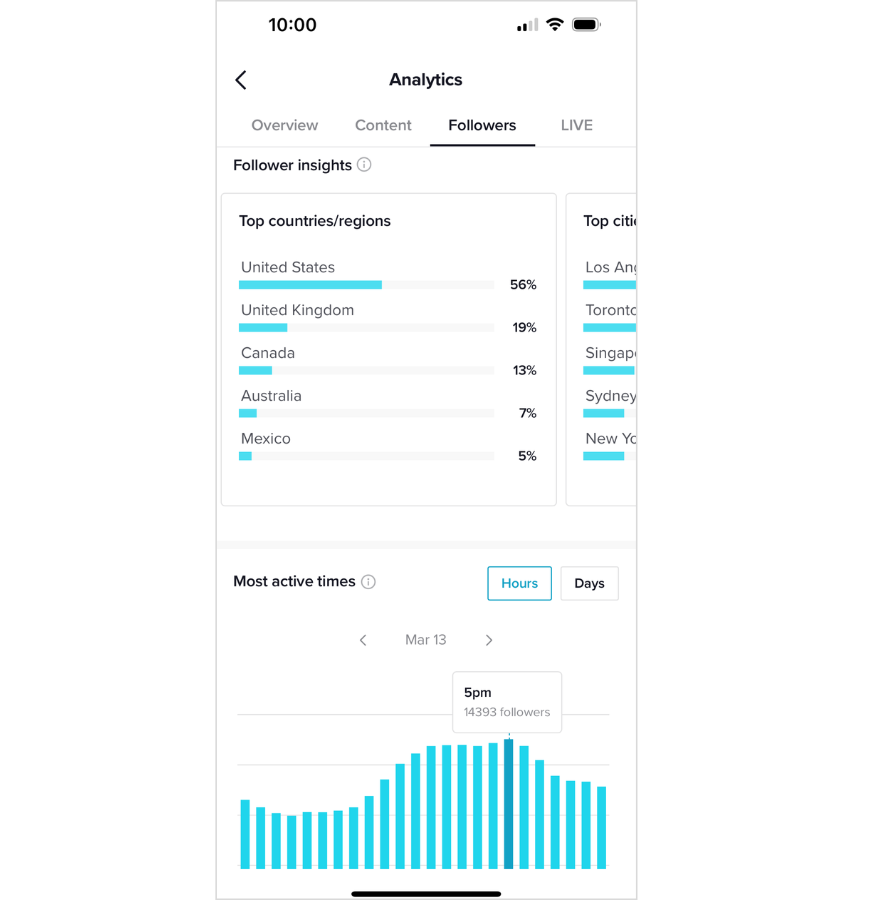
And for even more in-depth analytics, Later’s Analytics tool gives you a visual overview of your audience and how your content is performing:
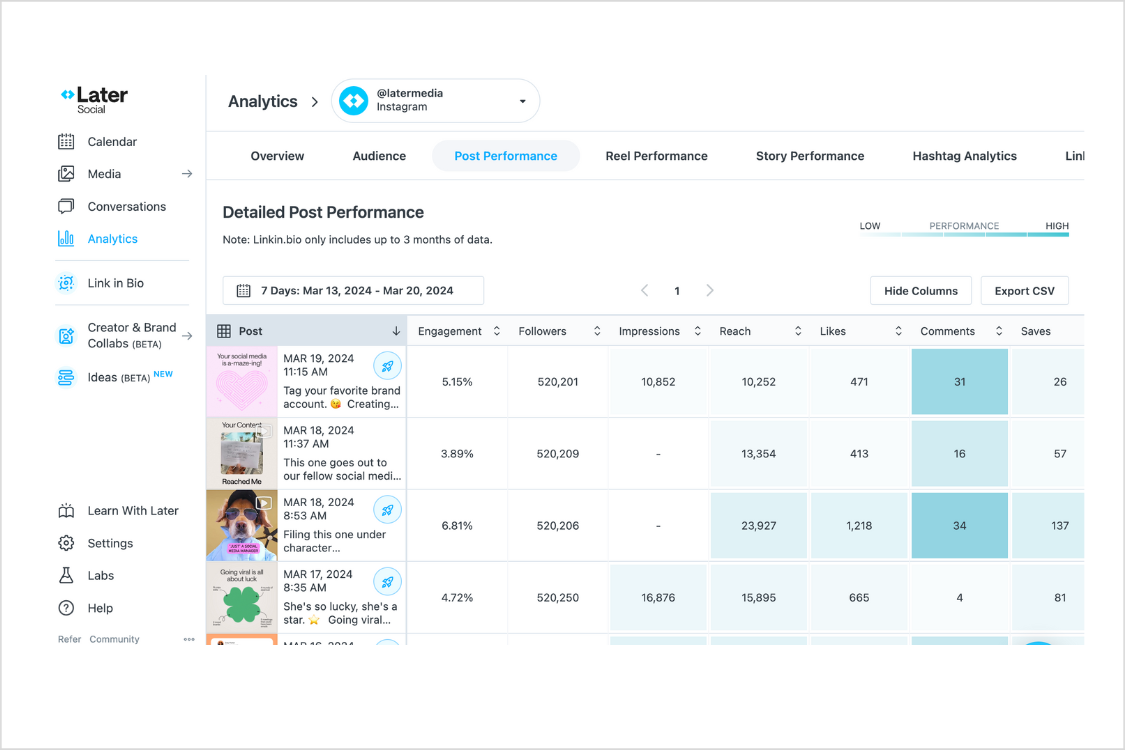
With your Later plan, you can track up to 12 months' worth of Instagram feed posts, stories, and Reels, so you can see what's performing best.
Learning about your audience will also help you collaborate with brands that you know you'll love and might buy from too.
Discover what content resonates most with your audience with Later's Social Media Analytics dashboard — start your free trial today!
Step #4: Post Content Regularly
If you want to see growth on TikTok or Instagram and stay top of mind with your followers, it’s vital to show up every day. In fact, we did the research to determine exactly how often you need to post on Instagram.
But creating content takes a ton of time and effort. You have to set up your equipment, find good lighting, and get in the zone — and that’s all before the cameras start rolling.
Our #1 solution? Content batching.
Set aside a day to film all your content, create graphics, or take photos at home in one productive session:
You can also use this bulk batching day for pretty much everything — from writing post captions to finding user-generated (UGC) content.
It’s the ultimate time-saver. Plus, once you're done content batching, you can schedule all your content to post at scale. Easy peasy.
Ready to put your new content batching strategy to work? Create a Later account and start visually planning and scheduling your content today!
Step #5: Shoot Reels and TikToks
The popularity of short-form video has skyrocketed in the last few years with the rise of TikTok and the introduction of Instagram Reels.
Mastering short-form videos and posting consistently can lead to massive growth and engagement.
Here are our five top tips:
Just start: For many influencers who have spent their entire careers shooting photos for social media, the pressure to learn short-form video can be nerve-wracking, but the best way to get better at something is to practice. What you create won’t be “perfect” at first, but through practice, you’ll find your groove and enjoy the process.
Do research: In order to create engaging Reels or TikToks, dedicate 15 minutes per day to researching what others are creating. This will allow you to keep up with trending videos and get inspired by others in your niche.
Make sure your videos serve a purpose: Every video you post should be either educational, inspirational, and/or relatable within your niche.
Open with a hook: In order to gain views and maximize the reach of your videos, you need to “stop the scroll” by starting with some type of hook. You can do this in a variety of ways: a visual hook (like text) that calls out your audience’s problem or desire, or through movement, like waving at the camera.
Batch your Reels or TikTok content: Consistently posting will positively impact your account and the performance of all of your content. In order to stay consistent with your video content, batch them in advance for the next week and schedule your Reels with Later!
TIP: Making short-form video content isn’t easy. Get started with our Guide to Instagram Reels and our step-by-step guide for How to Make a TikTok.
Step #6: Cultivate an Influencer Community
While growth and engagement rates are important metrics to be mindful of, influencers should also focus on the quality of the community they are creating.
When you’re hyper-focused on breadth, you might have a very large audience, but one that doesn’t necessarily trust your advice because you haven’t spent the time engaging with it.
In comparison, when you’re hyper-focused on depth, you’ll have an audience that trusts your recommendations, buys the products you recommend, and follows you to other platforms.
No matter what stage you’re at in your influencer career, building relationships within your community is the single most important thing you can do.
Here are five ways to build community:
1. Show up on camera and share the person behind your brand. This can humanize you or your brand and create a deeper, more emotional connection between you and your community:
2. Use engagement-boosting features. Why? Using features like Poll and Question stickers can encourage more interactions from your audience.
3. Listen to your community. Ask your audience to share what products they would like to see next. Remember, engagement is a two-way street:
4. Share user-generated content. Showcase real people (from your community!) using and enjoying your products or services.
5. Engage with your audience. It can be as simple as setting time aside every day or week to respond to your comments and DMs.
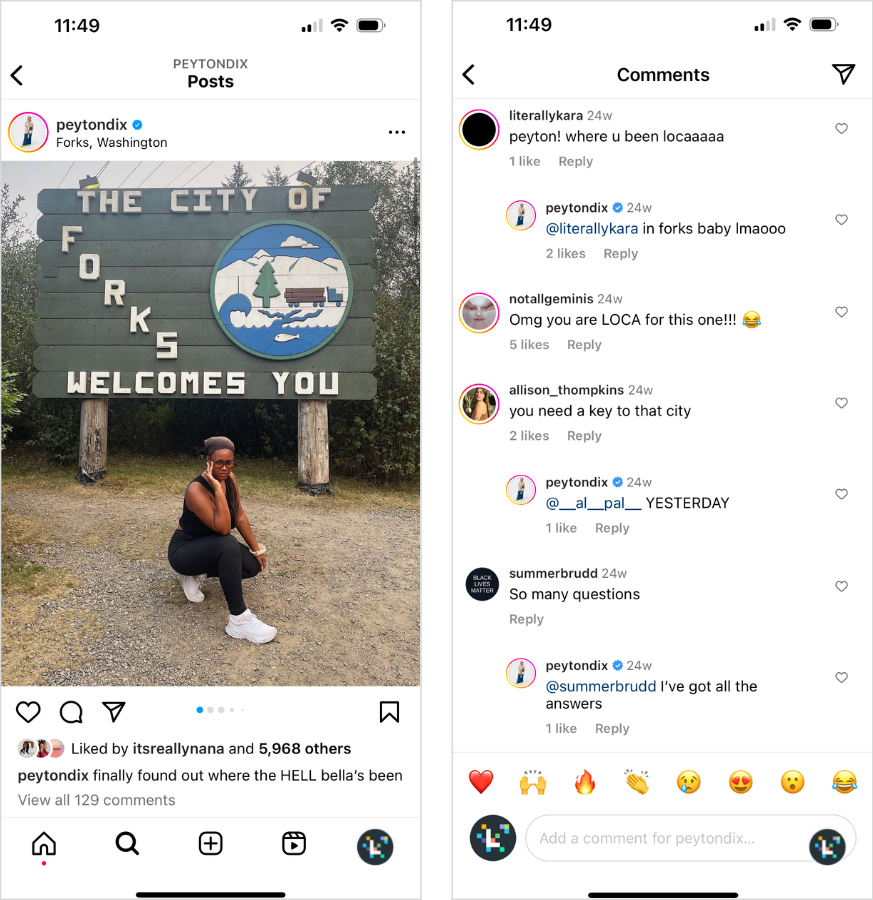
Step #8: Find Brands That Work With Influencers
Creating sponsored content for brands is a great way to make money as an influencer and expand your reach — whether it’s on TikTok, YouTube, or Instagram.
And the best part? You don’t need to have millions of followers.
Follow these three steps to put yourself out there, and pitch to brands:
Step #1: Get started by creating a pitch email.
This should be brief — think 2-3 paragraphs in length — and give an overview of your success in building brand awareness or driving conversions.
TIP: You can easily turn successful emails into reusable templates using an email template builder.
Step #2: Once you have your pitch drafted, it’s important to make sure it lands in front of the correct person.
To find the correct contact to pitch to, either search for the brand on LinkedIn and reach out to someone on the marketing team, or send a DM on social media asking for the best email point of contact.
Step #3: Make sure to include these five key components in your pitch:
Craft the Perfect Subject Line
Introduce Yourself
Highlight What You Love About the Brand/Product
Create and Attach a Media Kit
Share Your Rates and a Call-to-action (CTA)
When crafted with care and intention, you can stand out from the crowd and start to build a long-term partnership or a robust campaign.
Good luck and happy pitching!
HACK: Sign up for Later's Influencer & Creator program for free and make it easy for brands that your customers love to find your profile and start working with you.
Hopefully, these tips have given you some inspiration and insight to improve your social strategy as an influencer.
Remember, success doesn’t happen overnight, but with a consistent posting cadence and commitment to your social channels, you’ll soon see a return in your efforts.
ICYMI: Later's influencer marketing platform lets brands discover and connect creators. Learn how to join our influencer network and start working with your favorite brands. Join today!
